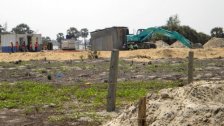By Preetadhar (Posted: November 17, 2014)
On 10 November, 2014, in a significant decision, the National Green Tribunal (NGT) – the specialized environmental court in India – quashed the Environment Clearance (EC) for the 3600 MW thermal power plant of IL&FS in Tamil Nadu. The Tribunal held that the project proponent had a “casual approach” in conducting the cumulative impact assessment of the project, which was based on incomplete information and “non-existent” standards. It also held that the EC was granted by the Ministry of Environment and Forests (MoEF) without application of mind.
The project is proposed to be a developed as a part of a Petroleum, Chemicals and Petrochemicals Region (PCPIR) with a port, several industries and associated development of infrastructure. Further, the area – proposed in the close proximity of Cuddalore Industrial Area (SIPCOT) – has a high Comprehensive Environmental Pollution Index (CEPI) index, and was, until recently, classified as a “critically polluted area”. It is also located close to the Pichavaram mangroves – an ecologically fragile ecosystem. However, although the Environment Impact Assessment (EIA) requires a study of the cumulative impact of the project, the project proponent had mentioned that there would be no cumulative impact, and did not provide any information of other “existing or planned projects” in the area. In light of this, in 2012, the NGT had stayed the EC and directed the project proponent to conduct cumulative impact assessment studies.
Following this, the project proponent conducted a “Rapid Cumulative Impact Assessment” within a period of only 2 weeks. No baseline data was collected and a large number of projects were not considered. “The project proponent considered the data available for eight industries only whereas … there are at least 45 industries in 25 km radius of the project and no reasons have been given as to why the same have not even found a mention in the study”, observed the Tribunal. Moreover, it was claimed that future projects are not even required to be considered to be part of the CIA. Ironically, the “Technical EIA guidance manual for thermal power plants” prepared for the MoEF by IL&FS Ecosmart Ltd, a sister concern of the project proponent itself, specifically mentions that all direct and indirect impacts of all reasonably foreseeable projects are required by be taken into account. Most shockingly, the standards used for the entire study were the “non-existent” National Ambient Air Quality Standard (NAAQS), 2005. The relevant standards are NAAQS 2009, which replaced the earlier NAAQS 1998. There is nothing known as NAAQS 2005. On the basis of these findings, the Tribunal categorically held that the Cumulative Environmental Impact Assessment was inadequate and erroneous.
The judgment also underlines the fact that a careful scrutiny of the EIA report by the Expert Appraisal Committee (EAC) and the MoEF is an equally important part of the EIA process. The Tribunal was severely critical of the “casual approach” of the EAC. The “expert” appraisal committee approved the project without any application of mind. So much so, they did not even notice the fact that the entire study was conducted on the basis of non-existent standards and several pollutants and industries were inexplicably omitted. The MoEF, too, was no better. Only certain cosmetic and irrelevant conditions were imposed and “the MoEF did nothing more than merely reiterating the conditions previously stipulated … in different language”, observed the Tribunal.
The judgment marks a watershed moment in environmental litigation in India. Through its categorical findings, it brings to light the systemic failure across several levels – the cost of which is reflected in severe environmental degradation. This lays the groundwork for a better quality of EIA as well as scrutiny of EIA by regulatory authorities.
The judgment can be accessed at http://greentribunal.gov.in/Writereaddata/Downloads/50-2012(PB-I)(APL)-10-11-2014.pdf
